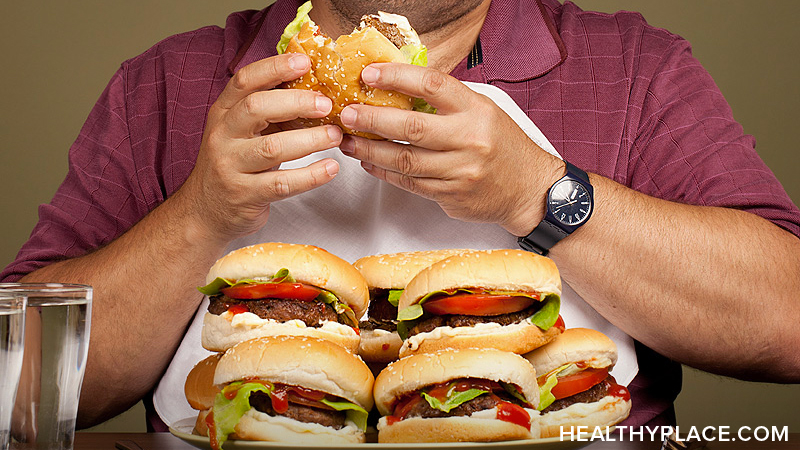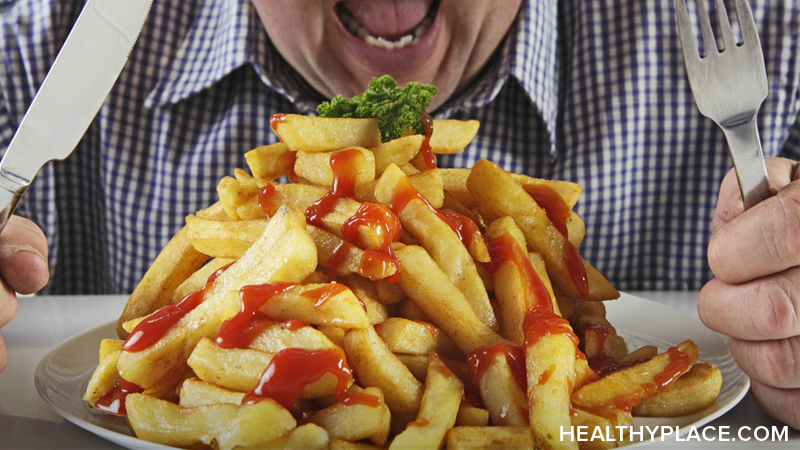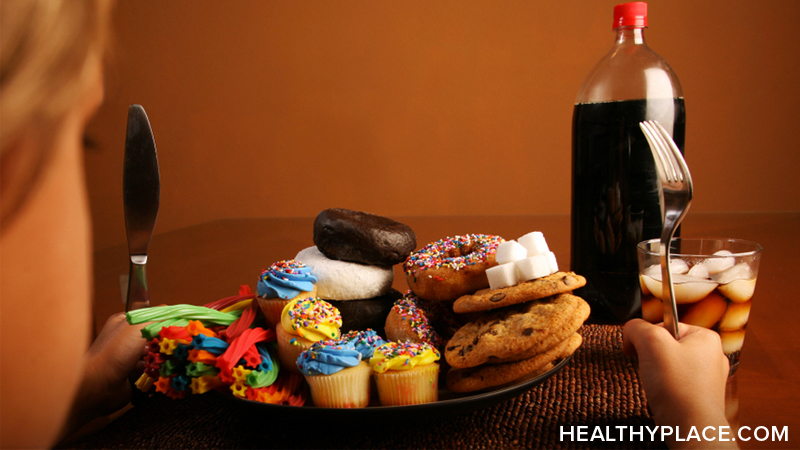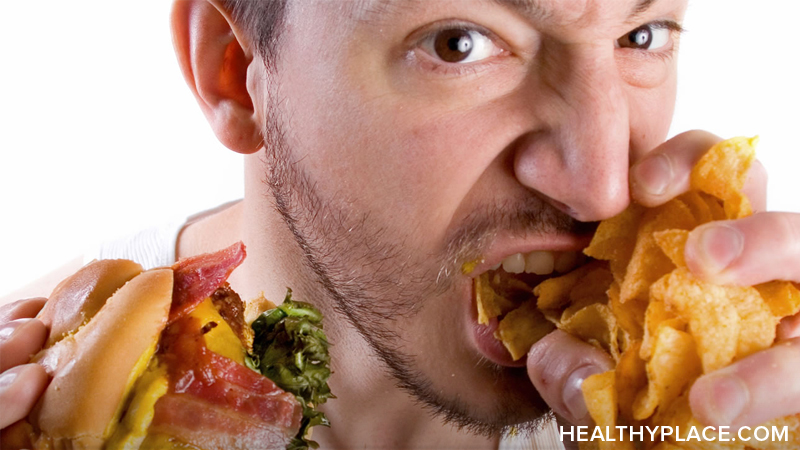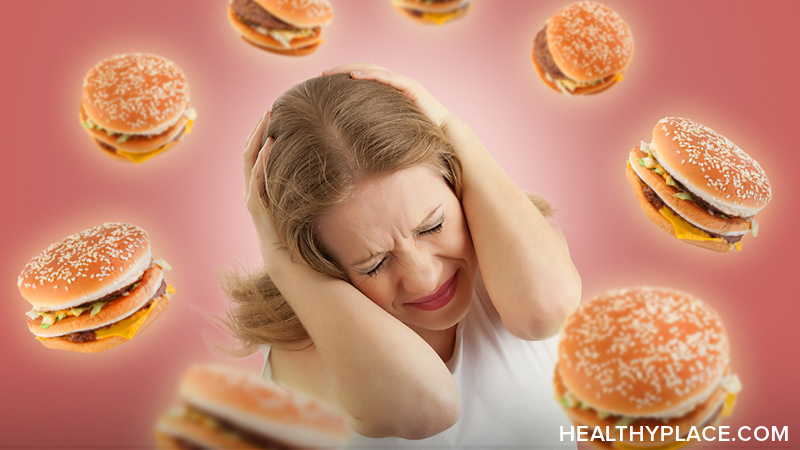What Is Binge Eating Disorder (BED)?
What is Binge Eating Disorder? Compulsive Eating Basics
Binge eating disorder is a mental illness characterized by compulsive overeating. Because of that, the condition is also referred to as compulsive eating disorder or compulsive overeating disorder (Binge Eating and Overeating: What's the Difference?) Amazingly, binge eating disorder is the most common eating disorder and in 2013 was officially recognized in the DSM-5 as an eating disorder diagnosis. (Wondering if you have binge eating disorder? Take a binge eating test.)
How Binge Eating Disorder Starts
Binge eating disorder develops over time with increasingly frequent compulsive eating behaviors (compulsive eating symptoms). While it may look to some like the person is simply glutinous or weak-willed, binge eating disorder is defined as addiction and needs to be treated with compassion.
The first warning sign that a person has a problem with compulsive overeating is often the weight gained by the binge eater. Loved ones watch as the person continues to eat more than normal and more than would be acceptable to others. The worst part of compulsive overeating is that the family may not even see the worst compulsive eating behaviors because binge eaters tend to keep their biggest binges a secret.
As the family sees their loved one continue to gain weight, they may get angry that the person is not taking care of themselves or their health. It's important, however, to keep in mind that binge eating disorder is a mental illness and it generally requires professional intervention to begin binge eating disorder treatment.
How Binge Eating Disorder Develops
Binge eating disorder, like all eating disorders, is complex; as it stems from the psychology of the individual. There is no single, identified cause of compulsive overeating but binge eating disorder commonly develops after a period of strict dieting.
"The development of an eating disorder serves a survival purpose. No matter how destructive overeating may be in a person's life, it is maintaining a level of existence that is tolerable, if barely," says Joanna Poppink, MFT, a specialist in compulsive eating treatment.2.
Like most mental illnesses, biological, psychological and environmental factors all play a role in the cause of binge eating disorder. Therapist and former compulsive overeater, Jane Latimer, says she likes to follow three tracks when determining the cause of a person's overeating problem:3
- Track 1 is looking at the biochemistry.
- Track 2 is looking at the underlying emotional issues.
- Track 3 would be the relationship to food itself."
Binge eating disorder often begins in late-adolescence but can last for many years before any treatment is sought. Poppink explains that "... everyone who comes into therapy is in a different stage of their eating disorder. Some people have been binging and purging for a year or so. Others have been engaging in various eating disorder behaviors for as much as 25 or 35 years."
And while it's often obvious to the binge eater that they have a problem, they generally only scratch the surface of why they engage in compulsive overeating. "Most do know that they use the binging to cope with their lives. Unfortunately, they often do not appreciate the details," says Poppink.
Repercussions of Binge Eating Disorder
Binge eating disorder is commonly noticed and considered problematic after the compulsive eater becomes overweight, but by then damage can already be done. The compulsive overeater may already be suffering from:
- High blood pressure
- Type 2 diabetes
- High blood cholesterol
- Heart disease
as well as other health problems associated with obesity.
Perhaps worse is that psychological patterns have become ingrained to the point where dealing with stress through compulsive overeating is the only coping mechanism the person has left. Compulsive overeating disorder is also associated with high levels of depression and suicidal thoughts.
What To Do If You Have Binge Eating Disorder
The main treatment for binge eating disorder is therapy. There are several types of binge eating therapy known to work for compulsive overeating disorders. Hospitalization is extremely rare and only occurs when severe medical or psychiatric complications exist.
"People overeat or binge because they are experiencing some kind of stress for which they have no tools or skills to handle," explains Poppink. "Often these people are extremely capable. However, somewhere in their history, they learned to cope with stress through food behaviors because they had no access to other methods of protection, adaptation or development."
Binge eating disorder is very common, affecting 1 million to 2 million adults in the United States. While compulsive overeating occurs most commonly in people with severe obesity, people with a normal weight can also be affected.
Obese people often try to handle weight-loss on their own, but for someone with binge eating disorder, a diet may ultimately make the disorder worse. Compulsive overeating disorder requires treatment for the psychological reasons behind the compulsive overeating before weight-loss can be attained.
Recovery From Binge Eating Disorder
It's necessary to understand why a person compulsively overeats before the behavior itself can be changed, so therapy is the first step to attaining recovery from binge eating disorder and learning to stop binge eating.
"There are so many scary feelings that a person doesn't know how to deal with. They can't make sense of it. It's very overwhelming. So, it's easier just to go back to the food," says Latimer.
Those who engage in compulsive overeating and are obese risk:
- Heart problems
- Stroke
- Breathing problems
- Musculature problems
And ultimately shortened life expectancy.
With binge eating disorder treatment though, compulsive eating disorder can be brought under control, explains Poppink.
"When we overeat, if we recognize that we are feeling something that we do not know how to accept, then we have the guiding tool to recovery. Then we can look in our lives, in our dreams, in our last conversation and try to find what it was that made us try to run away to oblivion for safety. Once we're on that path, there is no limit to the degree of healing and personal development we can achieve."
APA Reference
Tracy, N.
(2022, January 4). What Is Binge Eating Disorder (BED)?, HealthyPlace. Retrieved
on 2025, October 31 from https://www.healthyplace.com/eating-disorders/binge-eating-disorder/what-is-binge-eating-disorder-compulsive-eating-basics
